Trump’s first presidential actions last week were announcements of Cabinet and sub-Cabinet nominees. In this second-go-around at the presidency, he now understands how critical it will be to have loyal officials in place to enact his preferred policies as efficiently and effectively as possible.
But what policies will they implement? Thus far, the agenda of Project 2025 is largely being carried out, particularly with regard to its policies on personnel and immigration. To get a sense of how ingrained Project 2025’s mission is with the Trump Administration, I did a simple comparison of Trump’s nominees and appointees with the people behind Project 2025. Here’s a summary of which personnel were either part of the Project 2025 team or affiliated with or promoted by The Heritage Foundation, the conservative* think-tank behind the Project.
The Cabinet
Trump announced his Cabinet and Cabinet-level nominees on his first day in office. Most of the list is yet-to-be-confirmed, but no one has yet failed confirmation.
Note: A “second-degree” connection means that the person was not explicitly affiliated with Project 2025, but very close associates (like employees or spouses) were, or that the policy they publicly espoused was cited as a policy preference.
There are two major takeaways here:
(1) John Ratcliffe and Russ Vought are very, very involved with Project 2025. Russ Vought authored the chapter on “The Executive Office of the President of the United States”. As Director of OMB, he will be directly responsible for ensuring all of Trump’s initiatives are staffed and budgeted for, and he will be able to make many prioritization decisions. With control of the resources, Vought will have a lot of power to sway both the presidential agenda and the enforcement of laws.
John Ratcliffe did not author a chapter, but he is listed as a formal Contributor. Based on the footnotes, it appears as if he was interviewed specifically for the formulation of the Project, and he is quoted in the text several times. Ratcliffe also was a Visiting Fellow for national security and intelligence at The Heritage Foundation. One of the other chapter authors—Dustin Carmack—was Chief of Staff to Ratcliffe when Ratcliffe was Director of National Intelligence during the first Trump Administration.
Given that Ratcliffe and Vought were both deeply involved in Project 2025 (and considering Ratcliffe’s additional close association with The Heritage Foundation), I would expect any decisions and actions under their policy purview to slant towards the goals of Project 2025.
(2) Robert F. Kennedy, Jr. was one of Trump’s nominees “applauded” by The Heritage Foundation. RFK Jr. is a Kennedy of course, and has a history of being a Democrat. For most of his career, he has been pro-choice and an environmentalist. One of the theories surrounding his chance of success during the Cabinet nomination process is that at least a few Republican senators will disapprove of his political history.
(Now I’m inserting my very biased opinion—It is just crazy to me that they might not vote for RFK Jr. because of his former party affiliation and not because he’s inclined to spread dangerous lies about public health and vaccines safety.)
Anyway, The Heritage Foundation has not bothered to issue a press release noting their approval with every candidate. That they did for RFK Jr. could give senators concerned about his political bonafides plenty of cover for approving his nomination.
Sub-Cabinet Personnel, Chairmen, and other Nominations
Trump also made other formal personnel announcements here, here, and here.
Stephen Bradbury (nominated for Deputy Secretary of Transportation) is listed as an official Contributor in Project 2025, but he and Michael Duffey (Undersecretary of Defense for Acquisition and Sustainment) have another, quite interesting, affiliation with Project 2025. They (like some White House staff below) performed in Project 2025 training videos for new staff. The videos were obtained and distributed by ProPublica last year.
One nominee worth a bit of discussion at the moment is David Weldon, slated to be Director of the Centers for Disease Control and Protection (CDC). The CDC, like other health agencies, has been under a communication “pause”. In addition, Trump neglected to name an acting CDC Director, leaving the agency without a leader. (The CDC website as of Jan. 24 lists Susan Monarez as Acting Director by default given her position as First Assistant to the Director, effective as of Jan. 23.)
Dave Weldon is mentioned in Project 2025’s Mandate for Leadership by way of his namesake, the Weldon Amendment, a rider on appropriations bills since 2005. This is the language prevents the federal government from funding entities (i.e., federal program or state or local governments) that discriminates against health care entities that refuse abortion services. That is, hospitals and health care plans that refuse to provide abortion services cannot be treated differently than ones that do by any entity that wants to receive federal funds. It is the “conscience clause” that allows providers to refuse service. Dave Weldon has also openly questioned the safety of vaccines. Thus, any notion that agency leaders within the Department of Health and Human Services might fight back against RFK Jr.’s worst vaccine impulses would dissipate if Dave Weldon is confirmed alongside him.
White House Staff
Trump has also named a number of staff members to support him in the White House and throughout the Executive Branch. Since there is no need to involve the Senate, these positions could change frequently, and given Trump’s managerial track record, they likely will. That said, many of these high-level staff members have been with Trump for several years or more now (e.g., Dan Scavino, Stephen Miller, Sebastian Gorka, Peter Navarro) and have shown immense loyalty (e.g., Dan Scavino, who began his career with Trump as a manager at Trump National Westchester, and his former personal lawyer Alina Habba).
Like some nominees mentioned above, Karoline Leavitt and James Braid also produced staff training videos for Project 2025.
Tom Homan is listed as a formal Contributor to Project 2025 as an affiliate of The Heritage Foundation. He has deep experience in federal immigration policy, and no doubt has the knowledge to implement any immigration policy ordered. His views on immigration are notably hard-line: he has been called the “father of” the so-called family separation policy. His thinking on the topic was described in a Pulitzer Prize-winning investigative article by Caitlin Dickerson for the Atlantic.
The Authors of Project 2025
To take another view of the connections between Project 2025 and Trump, let’s flip things around and look at the Project 2025 authors and editors:
It’s not all that surprising that many authors had experience in the most recent Republican administration (the first Trump administration), or even that many former Republican federal officials would find their way to The Heritage Foundation. Nonetheless, this amount of overlap would have provided an opportunity for Trump’s policy preferences to seep deeply into the conservative movement. For instance, Project 2025 has two chapters on trade: Peter Navarro’s “The Case for Fair Trade” (think tariffs) abuts Kent Lassman’s more traditional “The Case for Free Trade”. That is, Project 2025 is quite literally of two minds on trade.
The Heritage Foundation’s 2020 edition of the Mandate for Leadership—released in the summer of 2020, before the election was decided—is markedly more assured in its opinions on trade policy. The Solutions 2020 guide explicitly recommends to “[p]ermanently eliminate tariffs on all intermediate goods”, “[r]everse all ‘Buy American’ mandates” and “reassert congressional authority over trade”. So, no tariffs, few regulations.
I am not associated with the conservative movement. I have no idea why they allowed Peter Navarro to print his chapter on “fair” trade as a foil to Lassman’s chapter on “free” trade. I suspect—and it is only a suspicion—that after the 2020 election loss, and especially after prospective Republican Trump opponents failed to gain traction in the 2024 primaries, the conservative movement realized that Trumpism was the only way to go. Through the fog of the first few weeks and months, it should become clear whether their bet of throwing Trump some rhetorical bones has worked for getting most of their conservative agenda implemented.
* To be honest, I’m not entirely sure what “conservative" means these days.
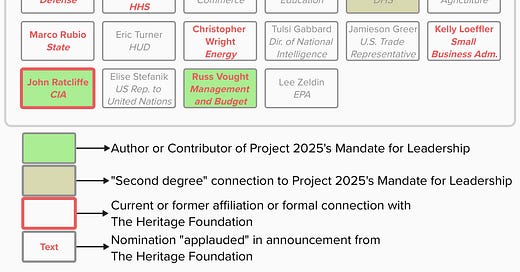



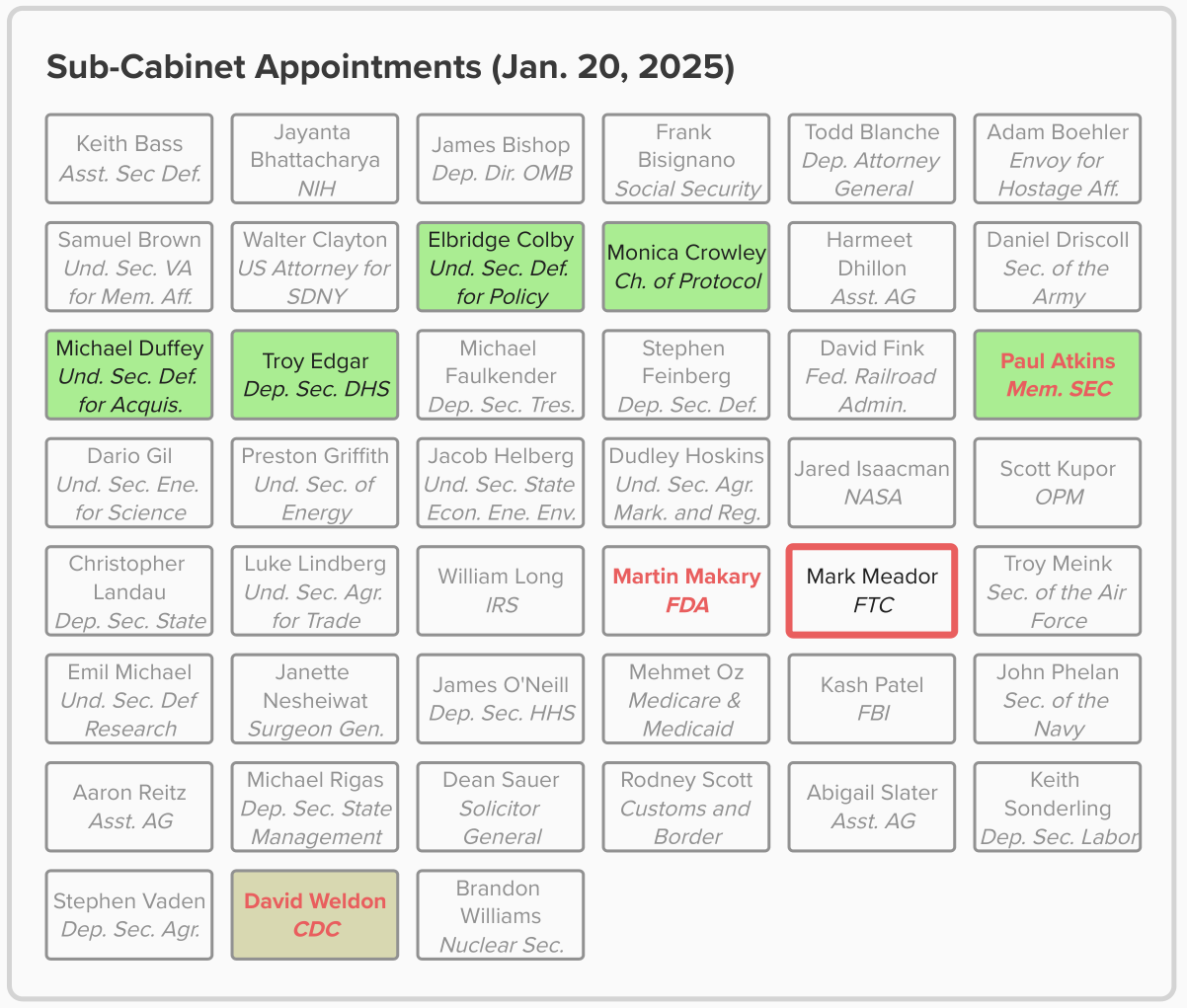
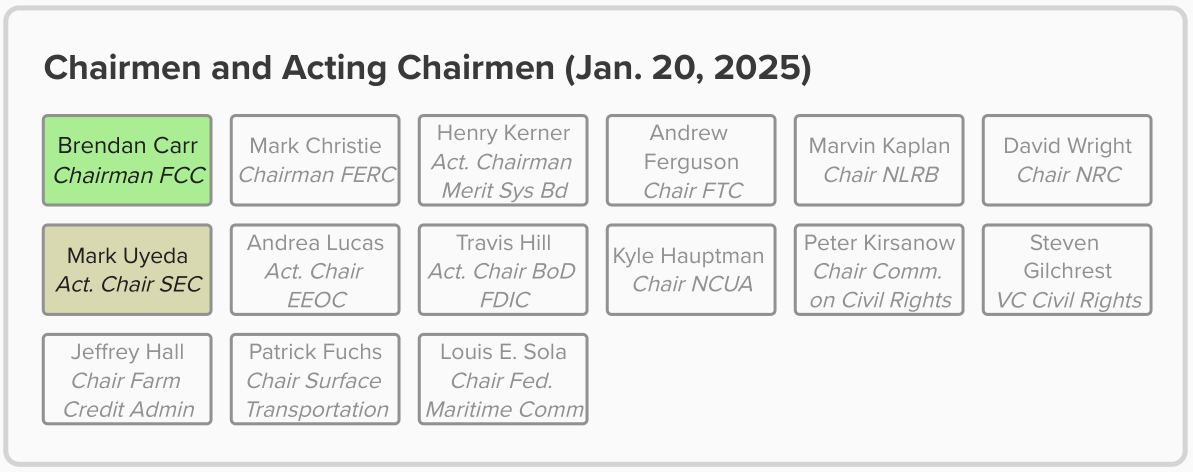
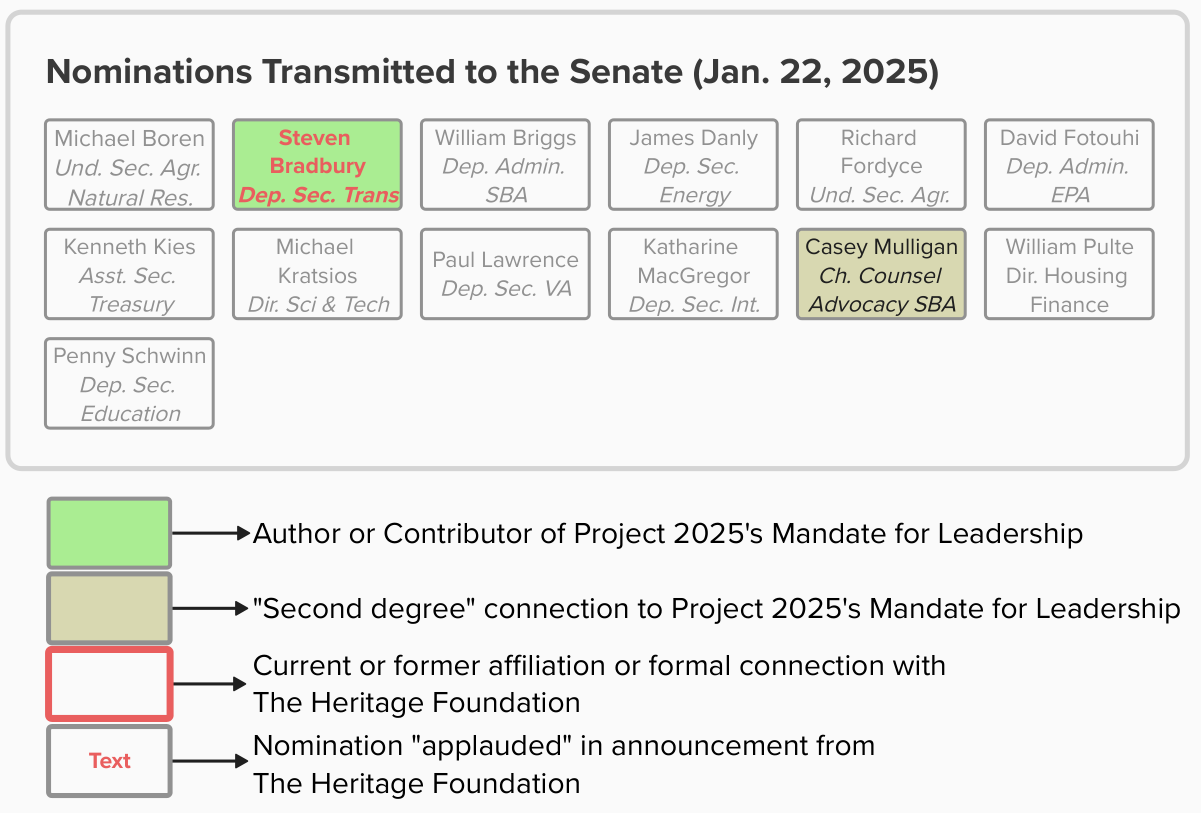
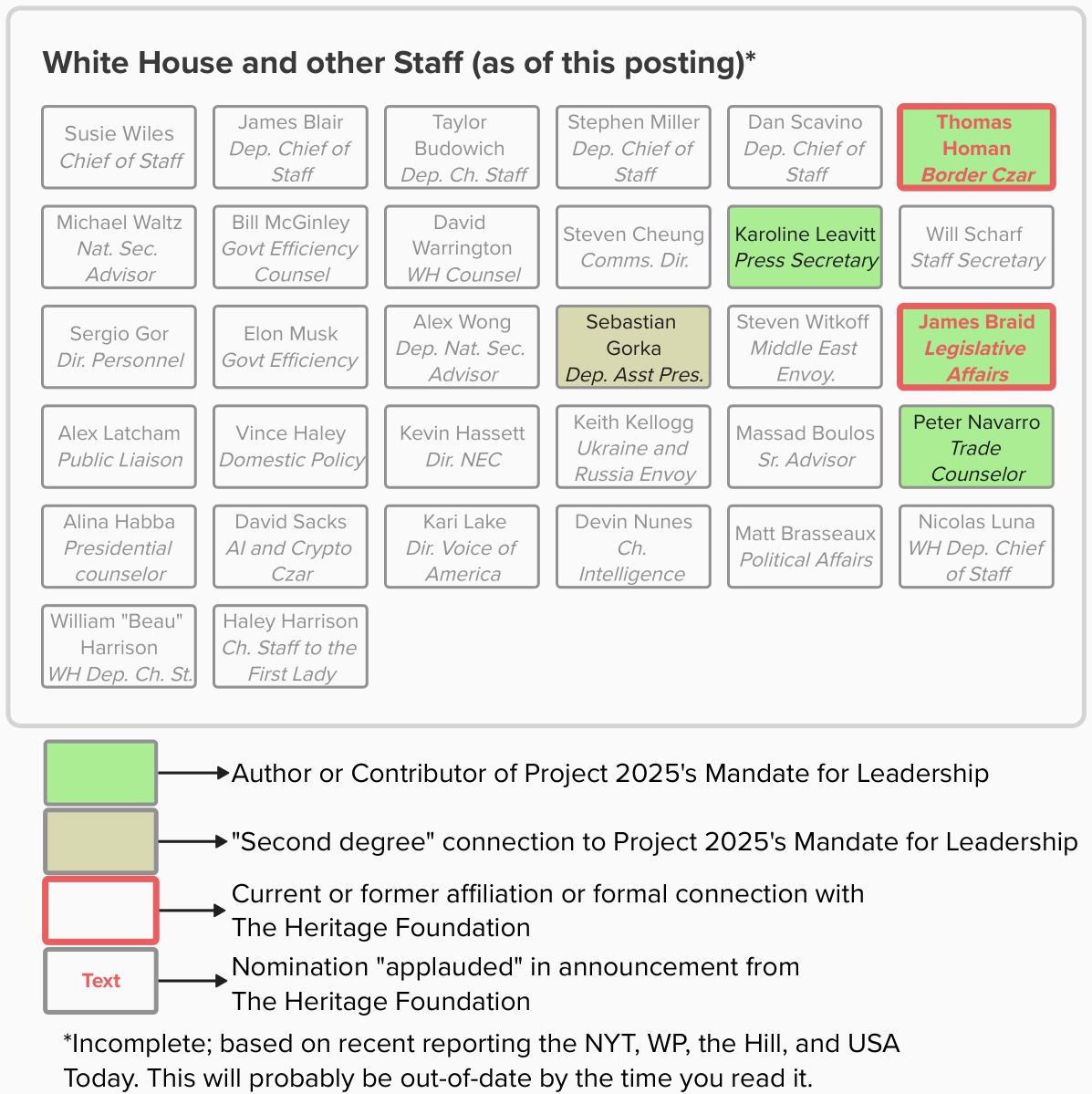
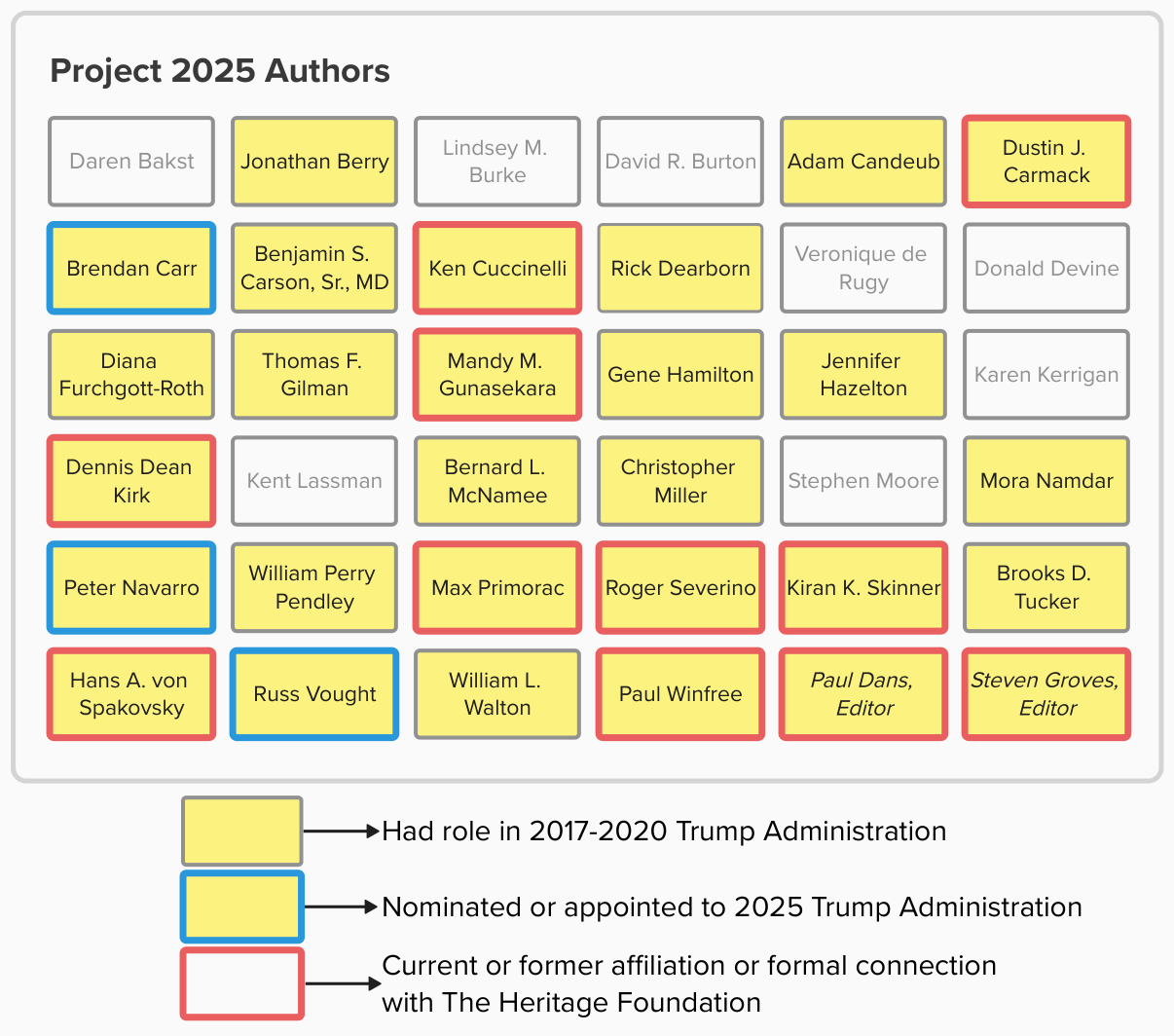
A complicated setup of people and policies that Donnie T said he knew nothing about. I believe him when he says that but the people connected to 2025 tell Donnie he is a great man so he signs what they put in front of him and takes credit but no blame. Now I am going back to the days of the Tri Lateral Commision pulling the presidential strings.